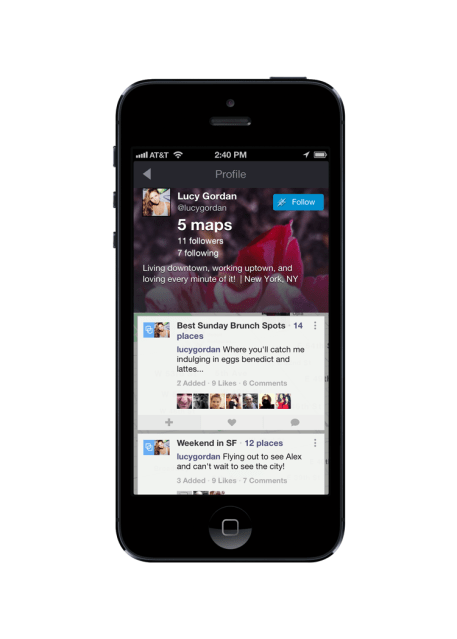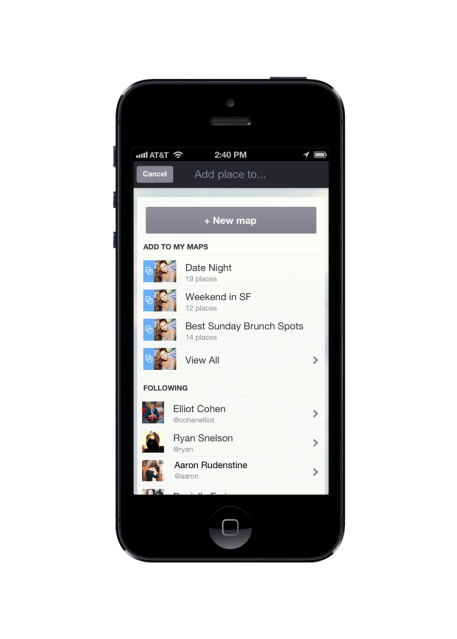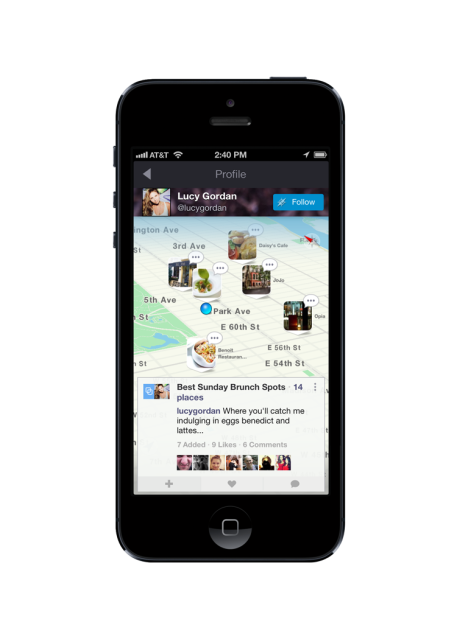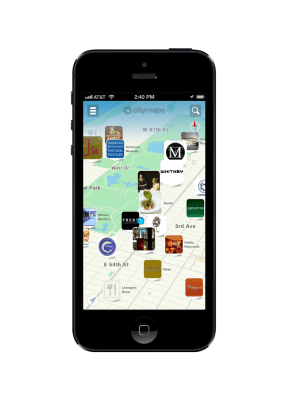CityMaps, a company in the news this week for a new version of its mobile mapping application for iOS, has raised an additional round of $1.5 million in outside funding – an extension of its earlier Series A, this time bringing in new investors, including Ashton Kutcher and Guy Oseary’s A-Grade Investments, Steve Papa (founder of Endeca, which sold to Oracle), and other angels. This additional round brings CityMaps’ total raised to date to $5 million.
We recently took to the time to talk to CityMaps about what it’s preparing to launch in the weeks ahead, and how the company will use the funding to further its goal of building a unique mapping product in the shadow of mapping giants like Google and others.
CityMaps has several upcoming features on the horizon, including a developer API, as well as features that could better connect local businesses to mobile consumers by alerting them to deals, promotions, nearby events, daily specials and more. But more broadly, the company wants to establish CityMaps as defining a new niche in the mapping ecosystem, where maps are no longer read-only creations accessed by users in need of information, but are rather personalized to individual users’ interests and preferences.
A “Loony Idea” Takes Off
 Over two and a half years ago, CityMaps co-founders Aaron Rudenstine and Elliot Cohen had an idea for a new kind of mapping interface — one whose focus, they explain, was not just on navigating your way around unfamiliar territory, but where maps became social, collaborative, and better highlighted the places where people spent their time and money, like stores, bars, restaurants, and other local businesses.
Over two and a half years ago, CityMaps co-founders Aaron Rudenstine and Elliot Cohen had an idea for a new kind of mapping interface — one whose focus, they explain, was not just on navigating your way around unfamiliar territory, but where maps became social, collaborative, and better highlighted the places where people spent their time and money, like stores, bars, restaurants, and other local businesses.
“Google Maps is the hallmark of maps. It’s a terrific product,” says Rudenstine. “But our whole vision for maps from day one — when Elliot approached me and said he had this loony idea to create a new map — is that maps should be more than just utilities that help you get from point A to point B.” He likens the idea for a collaborative map to the rest of the social web, where users find and follow others, and where maps become live and dynamic.
To be clear, CityMaps are not collaborative in the sense that OpenStreetMap is, meaning user-built maps of the streets and landmarks around you. OpenStreetMap, however, serves as one the product’s data sources, among others like Natural Earth, Factual, Localeze, as well as some data from strategic relationships CityMaps has made with Fortune 100 companies, which it’s not allowed to disclose. So rather, CityMaps’ collaborative functions are not about building the map itself, but live as a layer on top of the basic mapping data. The idea is that users can build their own maps of what matters to them, such as lists of favorite restaurants or stores, perhaps. In addition, it means that friends can suggest places they should add to their lists, too.
After raising $3.5 million over a couple of rounds of funding, the company launched what it now refers to as its “proof of concept” application in early 2012 — the fastest MVP it could put on the market to test whether or not the consumers would be interested in such an idea. This early version of CityMaps worked in just five cities — New York, Chicago, San Francisco, Boston and Austin — where it gained “many hundreds of thousands” of users, though less than a million.
 But the engagement levels were high enough for the company to push forward – over half (55 percent) of users were opening the app multiple times per week, the company found. The app also received good feedback, even winning the recommendation of the City of NY Dept. of Tourism, and gaining a deal which saw it replacing Microsoft’s mapping software in 7,000 NYC taxis this January.
But the engagement levels were high enough for the company to push forward – over half (55 percent) of users were opening the app multiple times per week, the company found. The app also received good feedback, even winning the recommendation of the City of NY Dept. of Tourism, and gaining a deal which saw it replacing Microsoft’s mapping software in 7,000 NYC taxis this January.
With the redesigned, revamped iOS app (product review here), CityMaps now includes over 15 million business locations across the U.S., allowing it to work anywhere, not only in its originally supported, nearly half a dozen cities.
The company’s local data set includes the business name and location, as well as other information a user would want to know, such as the menu at a local restaurant, what kinds of clothes a clothing stores sells, when happy hour is, and more.
Maps That Communicate To You, Make Suggestions
In the near future, CityMaps will be rolling out a system to help users see more about what’s currently happening at all these venues, too.
Explains Rudenstine, this system, due out in just a few weeks, will leverage the company’s partnership with business listings service Yext. This will enable local business owners to post real-time messages about whatever it is they have to promote to CityMaps, along with all the other services Yext currently supports.
 Launch partners for the new in-map communication and recommendations feature set include Bliss Spa, Aeropostale, Gansevoort Hotel Group and Morgans Hotels (hotel chains), The Vitamin Shoppe, Bond New York, StyleCaster Media Group, and Time Out. Other businesses will also be able to claim their own venues and manage their events and communications in the near future, as well.
Launch partners for the new in-map communication and recommendations feature set include Bliss Spa, Aeropostale, Gansevoort Hotel Group and Morgans Hotels (hotel chains), The Vitamin Shoppe, Bond New York, StyleCaster Media Group, and Time Out. Other businesses will also be able to claim their own venues and manage their events and communications in the near future, as well.
Also coming soon is CityMaps’ bigger plans for map personalizations. After users sign in via Facebook, or later connect their social accounts like Facebook or Foursquare, CityMaps will be able to access their profile and/or check-in data to begin making some simple judgment calls about the kinds of things a user likes. As the user continues to engage with the product, CityMaps’ ability to refine those earlier judgment calls then improves.
“Our whole vision is that no two maps should be the same,” Rudenstine says. “When you pull up CityMaps, you should see a collection of logos that represent…businesses that CityMaps deems are relevant to you,” he explains. “At the most basic level, the personalization engine matches what we know about the businesses to what we know about you.”
Developer API Soon
Finally, in addition to the forthcoming launch of the personalization engine and recommendations, CityMaps is building out its API for developers, which would allow them to use CityMaps data in their own products. For instance, if Airbnb homeowners wanted to make a map for their guests of nearby restaurants and stores, they could use CityMaps to do so instead of Google. (Airbnb is not a partner on this, it’s just an example – but it is an A-Grade investment, so who knows). The company is also in discussions with OEMs, and will have announcements surrounding their adoption of the API soon, too.
There’s been a renewed interest in companies building mapping startups, following Apple’s booting of Google from its list of pre-installed apps for a map app of its own, not to mention the $1.1 billion acquisition of social traffic map Waze by Google, which not only helped its own interests in mapping, but also kept that data out of Apple’s hands.
CityMaps seems to think it’s now onto the next big thing in mapping with its personalization efforts, but it’s difficult to ignore the giant in the room, Google. With Google’s ever-expanding Google+ initiative, it could choose to light up maps with more collaborative and personalized features as well, by tapping into all the data it already knows about businesses and users alike.
But Rudenstine is hopeful, saying that the recent events have changed the way people think about maps. “People are now beginning to realize the importance of having a map,” he says. “The story of maps hasn’t yet been written.”
